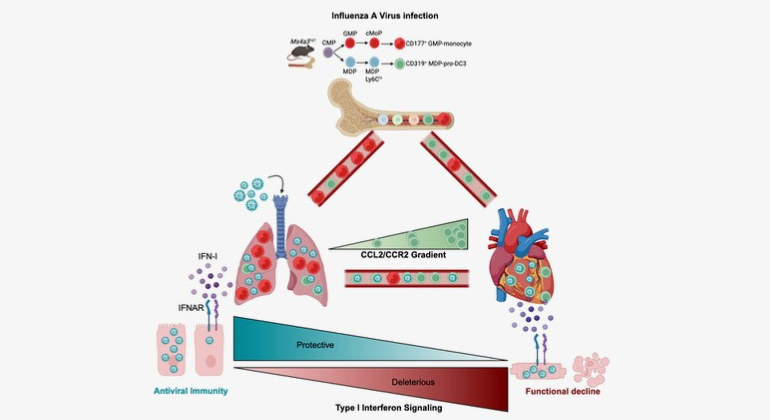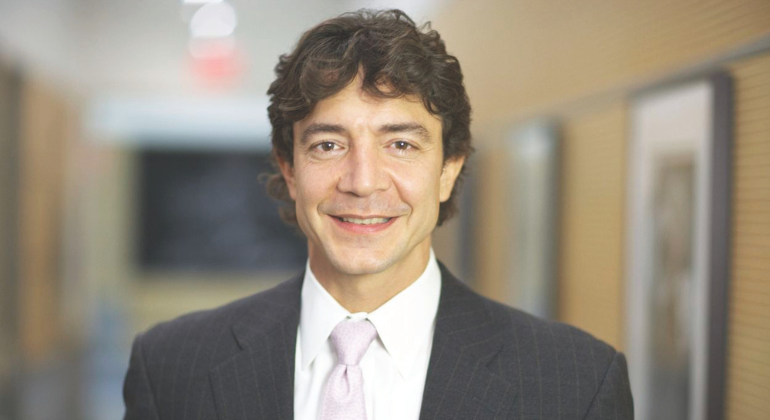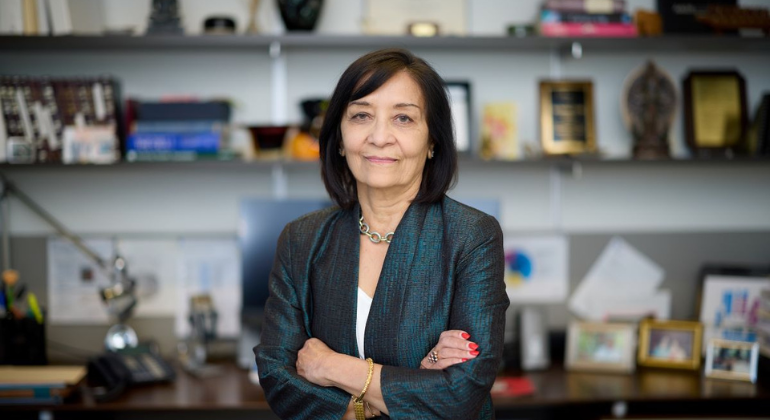Mount Sinai Researchers Identify Vulnerabilities of the Deadly Ebola Virus
Disabling a protein in Ebola virus cells can stop the virus from infecting, providing new understanding of how the virus suppresses the human immune system
Disabling a protein in Ebola virus cells can stop the virus from replicating and infecting the host, according to researchers from the Icahn School of Medicine at Mount Sinai. The data are published in July in the journal Cell Host and Microbe.
Ebola viruses cause severe disease in humans because they can deactivate the innate immune system. Christopher Basler, PhD, Associate Professor of Microbiology at Mount Sinai and his team have studied how Ebola viruses evade the immune system, and discovered that a viral protein called VP35 is critical to deactivating the immune system. They found that when VP35 interacts with an important cellular protein called PACT, it blocks PACT from activating the immune system, allowing the virus to spread.
“Ebola viruses are extremely lethal, and are a great threat to human health as a bioweapon,” said Dr. Basler. “Currently, there is no approved vaccine or treatment. Our findings will hopefully pave the way for future antiviral treatments.”
With the help of collaborators at the University of Texas with access to special high containment facilities, Dr. Basler and his team infected healthy cells with Ebola virus cells that had mutated versions of VP35. The mutations disabled VP35’s ability to interact with PACT, therefore allowing it to activate the immune system and prevent the virus from replicating. Next, the researchers overexpressed PACT in healthy cells, and infected them with Ebola virus cells. They found that overexpressing PACT also inhibited viral replication.
Armed with this discovery, Dr. Basler and his team hope to develop drugs that disrupt the interaction of VP35 with PACT, or drugs that overexpress PACT.
The work was supported in part by National Institutes of Health grants AI059536 and AI093786 .
About The Mount Sinai Medical Center
The Mount Sinai Medical Center encompasses both The Mount Sinai Hospital and Icahn School of Medicine at Mount Sinai. Established in 1968, the Icahn School of Medicine at Mount Sinai is one of the leading medical schools in the United States. The Icahn School of Medicine is noted for innovation in education, biomedical research, clinical care delivery, and local and global community service. It has more than 3,400 faculty members in 32 departments and 14 research institutes, and ranks among the top 20 medical schools both in National Institutes of Health (NIH) funding and by U.S. News & World Report.
The Mount Sinai Hospital, founded in 1852, is a 1,171-bed tertiary- and quaternary-care teaching facility and one of the nation’s oldest, largest and most-respected voluntary hospitals. In 2012, U.S. News & World Report ranked The Mount Sinai Hospital 14th on its elite Honor Roll of the nation’s top hospitals based on reputation, safety, and other patient-care factors. Mount Sinai is one of just 12 integrated academic medical centers whose medical school ranks among the top 20 in NIH funding and by U.S. News & World Report and whose hospital is on the U.S. News & World Report Honor Roll. Nearly 60,000 people were treated at Mount Sinai as inpatients last year, and approximately 560,000 outpatient visits took place.
For more information, visit http://www.mountsinai.org.
Find Mount Sinai on:
Facebook: http://www.facebook.com/mountsinainyc
Twitter @mountsinainyc
YouTube: http://www.youtube.com/mountsinainy
###
About the Mount Sinai Health System
Mount Sinai Health System is one of the largest academic medical systems in the New York metro area, with 48,000 employees working across seven hospitals, more than 400 outpatient practices, more than 600 research and clinical labs, a school of nursing, and a leading school of medicine and graduate education. Mount Sinai advances health for all people, everywhere, by taking on the most complex health care challenges of our time—discovering and applying new scientific learning and knowledge; developing safer, more effective treatments; educating the next generation of medical leaders and innovators; and supporting local communities by delivering high-quality care to all who need it.
Through the integration of its hospitals, labs, and schools, Mount Sinai offers comprehensive health care solutions from birth through geriatrics, leveraging innovative approaches such as artificial intelligence and informatics while keeping patients’ medical and emotional needs at the center of all treatment. The Health System includes approximately 9,000 primary and specialty care physicians and 10 free-standing joint-venture centers throughout the five boroughs of New York City, Westchester, Long Island, and Florida. Hospitals within the System are consistently ranked by Newsweek’s® “The World’s Best Smart Hospitals, Best in State Hospitals, World Best Hospitals and Best Specialty Hospitals” and by U.S. News & World Report's® “Best Hospitals” and “Best Children’s Hospitals.” The Mount Sinai Hospital is on the U.S. News & World Report® “Best Hospitals” Honor Roll for 2025-2026.
For more information, visit https://www.mountsinai.org or find Mount Sinai on Facebook, Instagram, LinkedIn, X, and YouTube.

New Research Sheds Light on Why Eczema So Often Begins in Childhood
Feb 25, 2026 View All Press Releases
Research Identifies Blind Spots in AI Medical Triage
Feb 24, 2026 View All Press Releases
Mount Sinai Study May Help Cancer Patients Keep Their Bladder
Feb 19, 2026 View All Press Releases
Can Medical AI Lie? Large Study Maps How LLMs Handle Health Misinformation
Feb 09, 2026 View All Press Releases
Mount Sinai Scientists Uncover Link Between Influenza and Heart Disease
Feb 09, 2026 View All Press Releases



